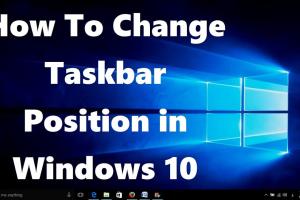Mastering Your Windows Taskbar: 2 Simple Methods to Change Its Position

-
Quick Links:
- Introduction
- Why Change the Taskbar Position?
- Method 1: Using Taskbar Settings
- Method 2: Using Registry Editor
- Common Issues When Changing Taskbar Position
- Conclusion
- FAQs
Introduction
The Windows taskbar is an essential interface component that not only helps you launch applications but also keeps you informed about system notifications and status. Adjusting the taskbar's position can enhance your productivity and tailor your desktop environment to your liking. In this article, we will explore two easy methods to change the Windows taskbar position, making your computing experience more comfortable and efficient.
Why Change the Taskbar Position?
Changing the taskbar's position can offer several advantages:
- Personalization: Everyone has different preferences for how they want their desktop organized. Changing the taskbar’s position allows for greater personalization.
- Accessibility: Depending on your monitor configuration, moving the taskbar can make frequently used applications more accessible.
- Screen Space Optimization: By positioning the taskbar on the sides or top of the screen, you can maximize your available screen space for applications.
- Aesthetic Appeal: A taskbar in a different position can create a more visually appealing desktop setup.
Method 1: Using Taskbar Settings
The easiest and most straightforward way to change the taskbar position is through the Taskbar settings. Here's a step-by-step guide:
Step 1: Open Taskbar Settings
- Right-click on an empty space in the taskbar.
- Select "Taskbar settings" from the context menu.
Step 2: Change Taskbar Location
In the Taskbar settings window:
- Look for the "Taskbar location on screen" dropdown menu.
- Select your desired position: Bottom, Left, Right, or Top.
Step 3: Confirm Changes
Your taskbar will automatically move to the new position you selected. Make sure to check if all your pinned applications are still accessible.
Method 2: Using Registry Editor
If you prefer a more advanced method or if the settings option doesn't work for you, you can use the Registry Editor to change the taskbar position. Follow these instructions carefully:
Step 1: Open Registry Editor
- Press Win + R to open the Run dialog box.
- Type regedit and press Enter.
- If prompted by User Account Control, click Yes.
Step 2: Navigate to Taskbar Settings
- In the Registry Editor, navigate to the following path:
HKEY_CURRENT_USER\Software\Microsoft\Windows\CurrentVersion\Explorer\StuckRects3.
Step 3: Modify the Taskbar Position
In the right pane, find the Settings binary value and double-click on it. You'll see a series of hexadecimal numbers. The fifth value (the second number after the first comma) is what determines the taskbar's position:
- 00 - Bottom
- 01 - Left
- 02 - Right
- 03 - Top
Change this value as needed and click OK.
Step 4: Restart Explorer
To apply the changes, you need to restart the Windows Explorer process:
- Press Ctrl + Shift + Esc to open Task Manager.
- Find "Windows Explorer" in the list, right-click it, and select "Restart."
Your taskbar should now be in the new position you selected.
Common Issues When Changing Taskbar Position
While changing the taskbar position is generally straightforward, you might encounter some issues:
- Taskbar Resetting: Sometimes, after a Windows update, your taskbar settings might reset. You may need to repeat the process.
- Missing Icons: Pinned applications might disappear when changing positions. Re-pin them if necessary.
- Screen Resolution Changes: Altering your screen resolution can affect the taskbar display. Ensure your resolution settings are optimal.
Conclusion
Changing the position of the Windows taskbar can enhance your productivity and create a more personalized experience. Whether you prefer the straightforward Taskbar settings method or the more advanced Registry Editor approach, both methods are effective. By following this guide, you can easily customize your desktop environment to best suit your workflow.
FAQs
1. Can I move the taskbar to any position on the screen?
Yes, you can move the taskbar to the bottom, left, right, or top of your screen depending on your preferences.
2. What happens if I accidentally delete a taskbar icon?
You can easily re-pin any application to the taskbar by searching for it in the Start menu, right-clicking, and selecting "Pin to taskbar."
3. Will changing the taskbar position affect my computer's performance?
No, changing the taskbar position does not impact performance; it’s merely a visual and organizational change.
4. Is it safe to use the Registry Editor?
Yes, but be careful. Making incorrect changes in the Registry can affect system functionality. Always back up the Registry before making changes.
5. Can I restore the taskbar to its original position?
Yes, you can easily return the taskbar to its original position using the same methods outlined in this guide.
6. What if I don’t see the taskbar settings option?
If you don’t see the option, ensure your Windows is updated. You can also try restarting your computer.
7. Can I use keyboard shortcuts to move the taskbar?
No, there are currently no keyboard shortcuts to move the taskbar directly; you will need to use the methods described above.
8. Will my settings change after a Windows update?
Sometimes, Windows updates can reset some settings, including taskbar position. Be prepared to reconfigure it if necessary.
9. Is there a way to lock the taskbar in place?
Yes, you can right-click on the taskbar and select “Lock the taskbar” to prevent it from moving accidentally.
10. Can I have multiple taskbars on different monitors?
Yes, if you have multiple monitors connected, each can have its own taskbar, and you can customize their positions individually.
Random Reads